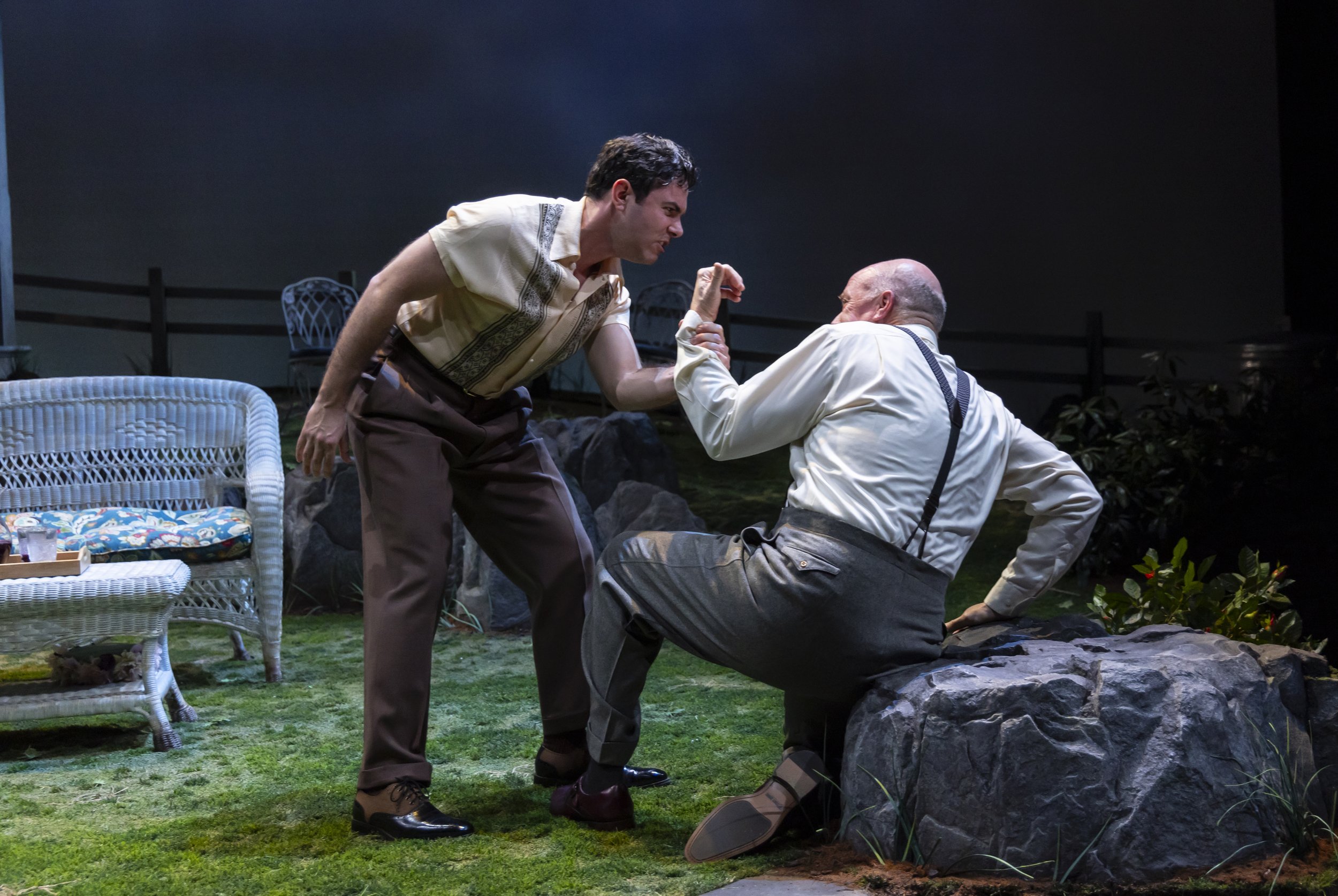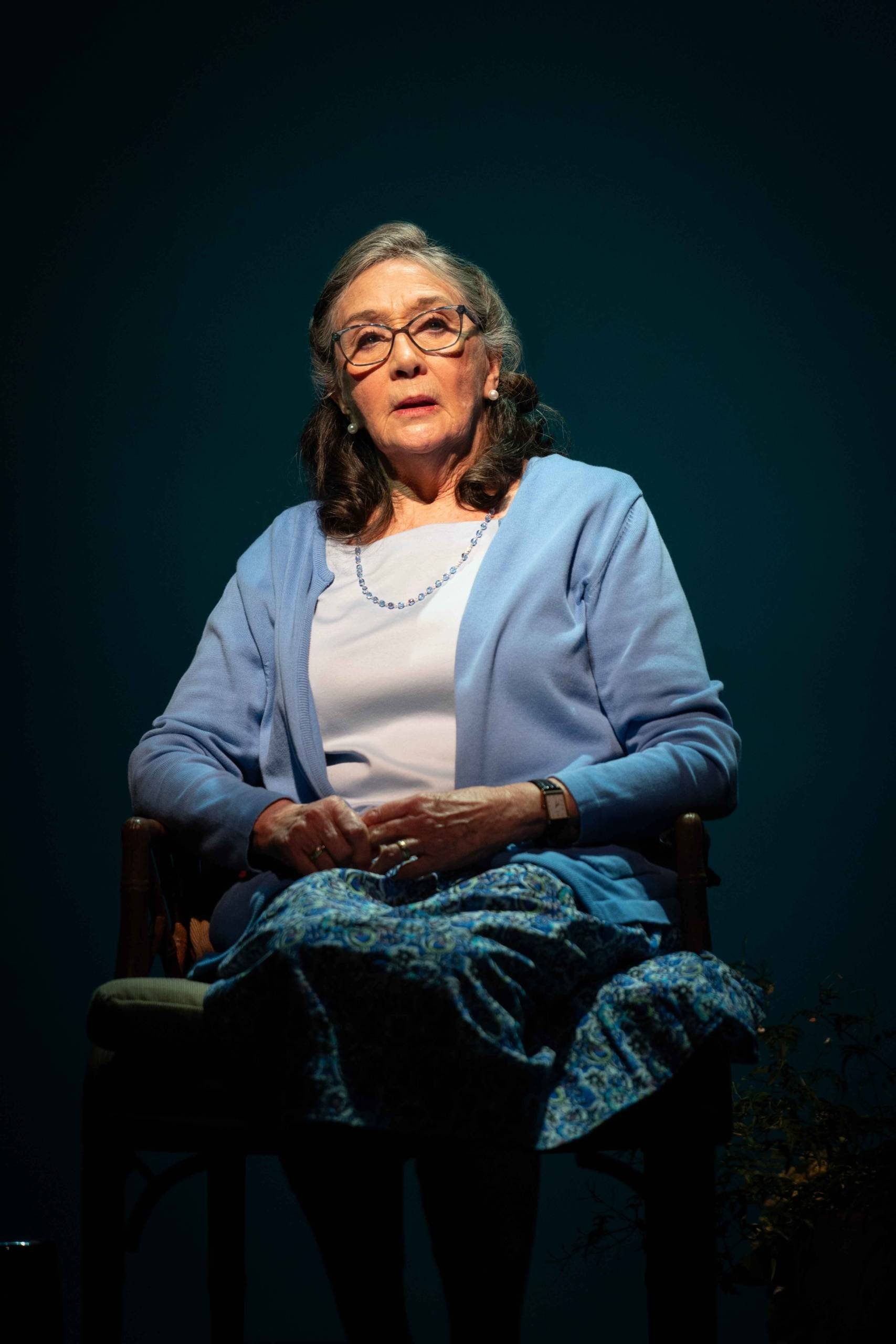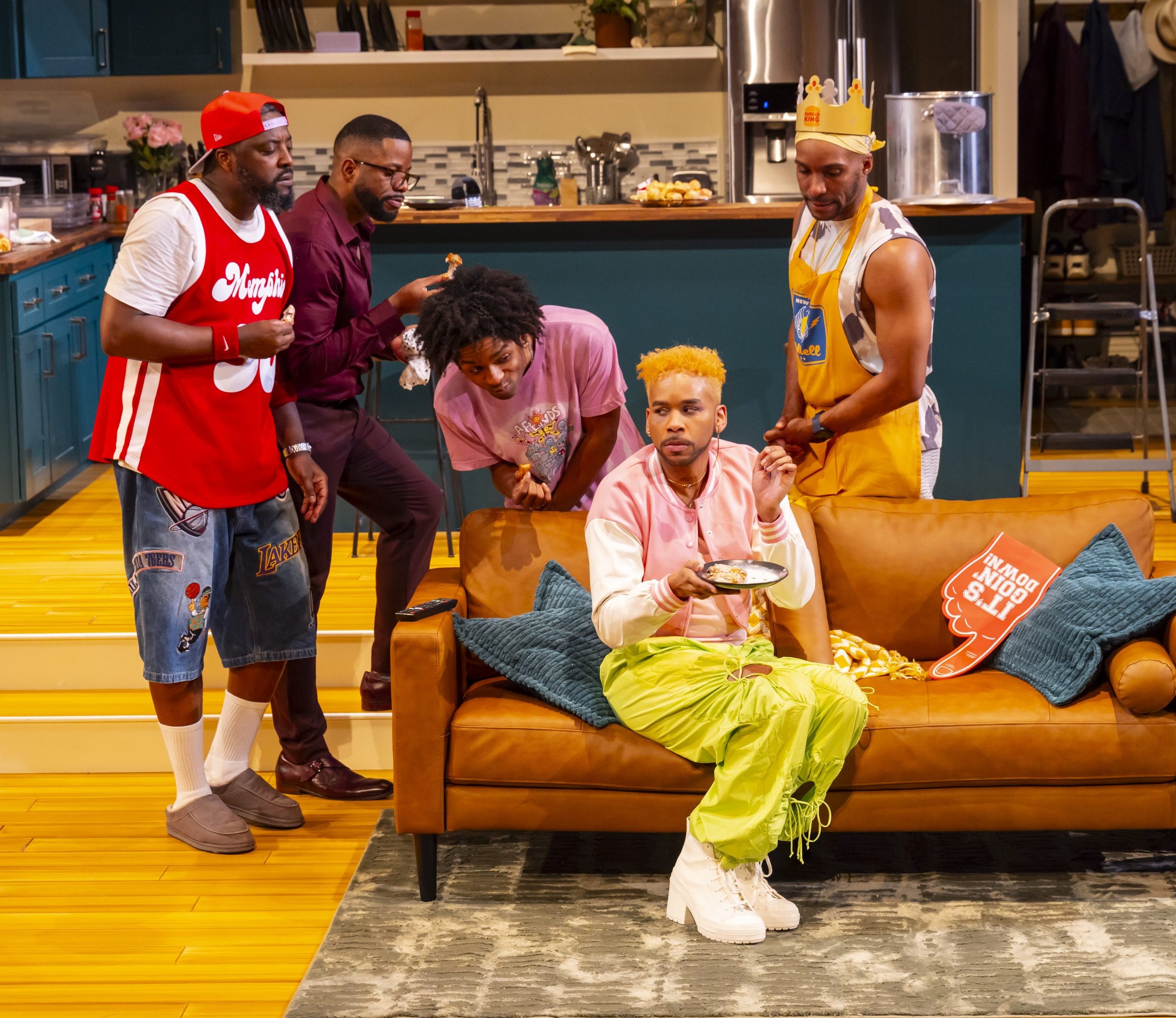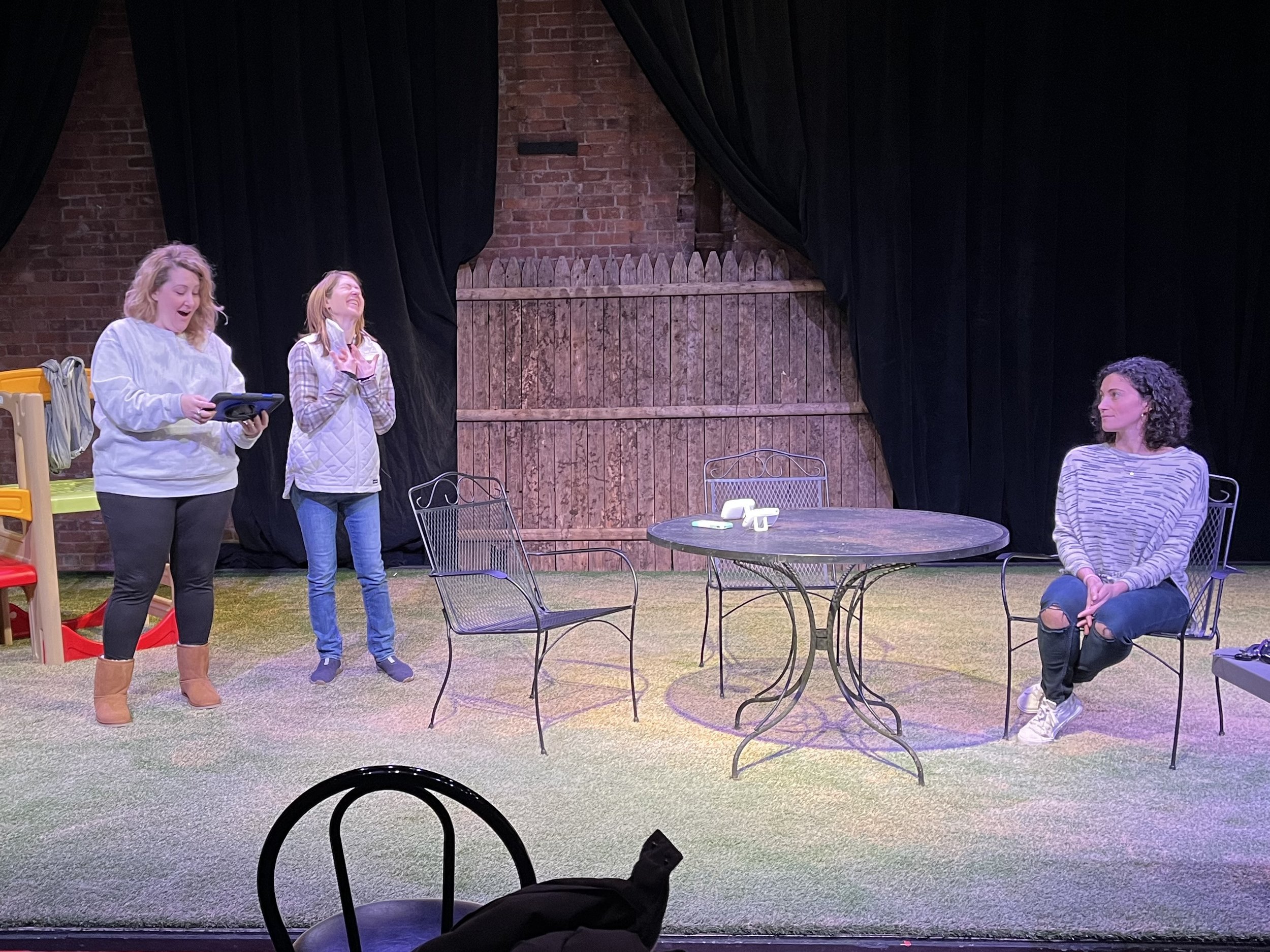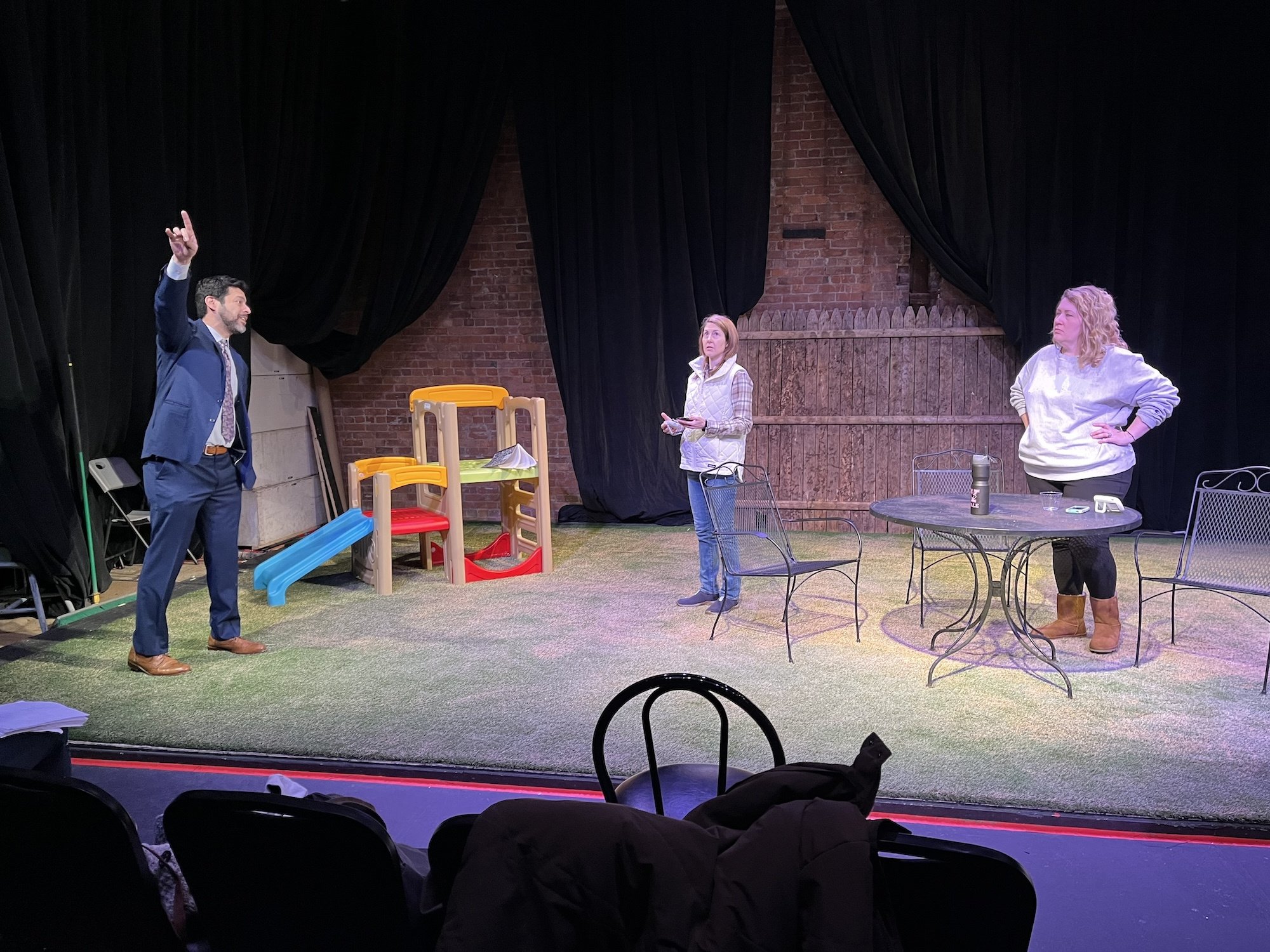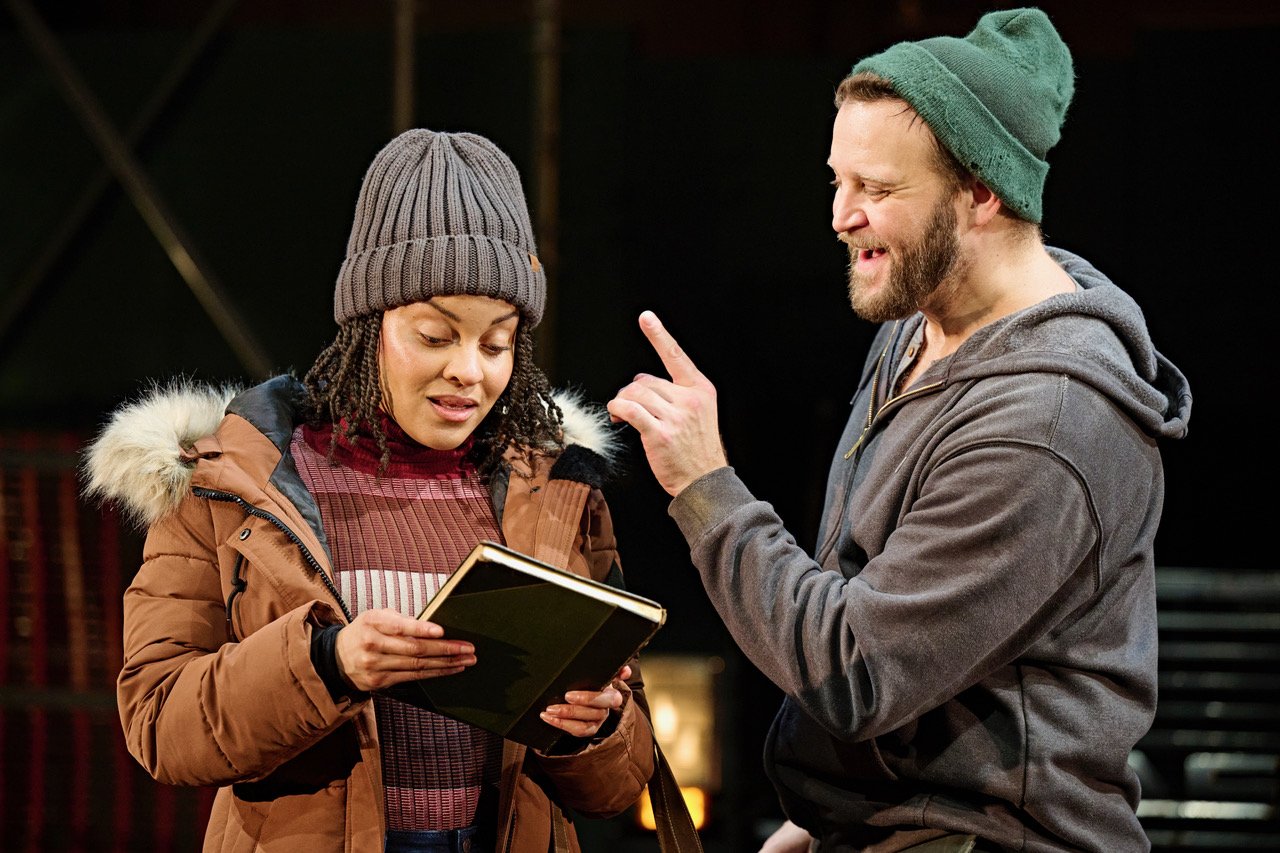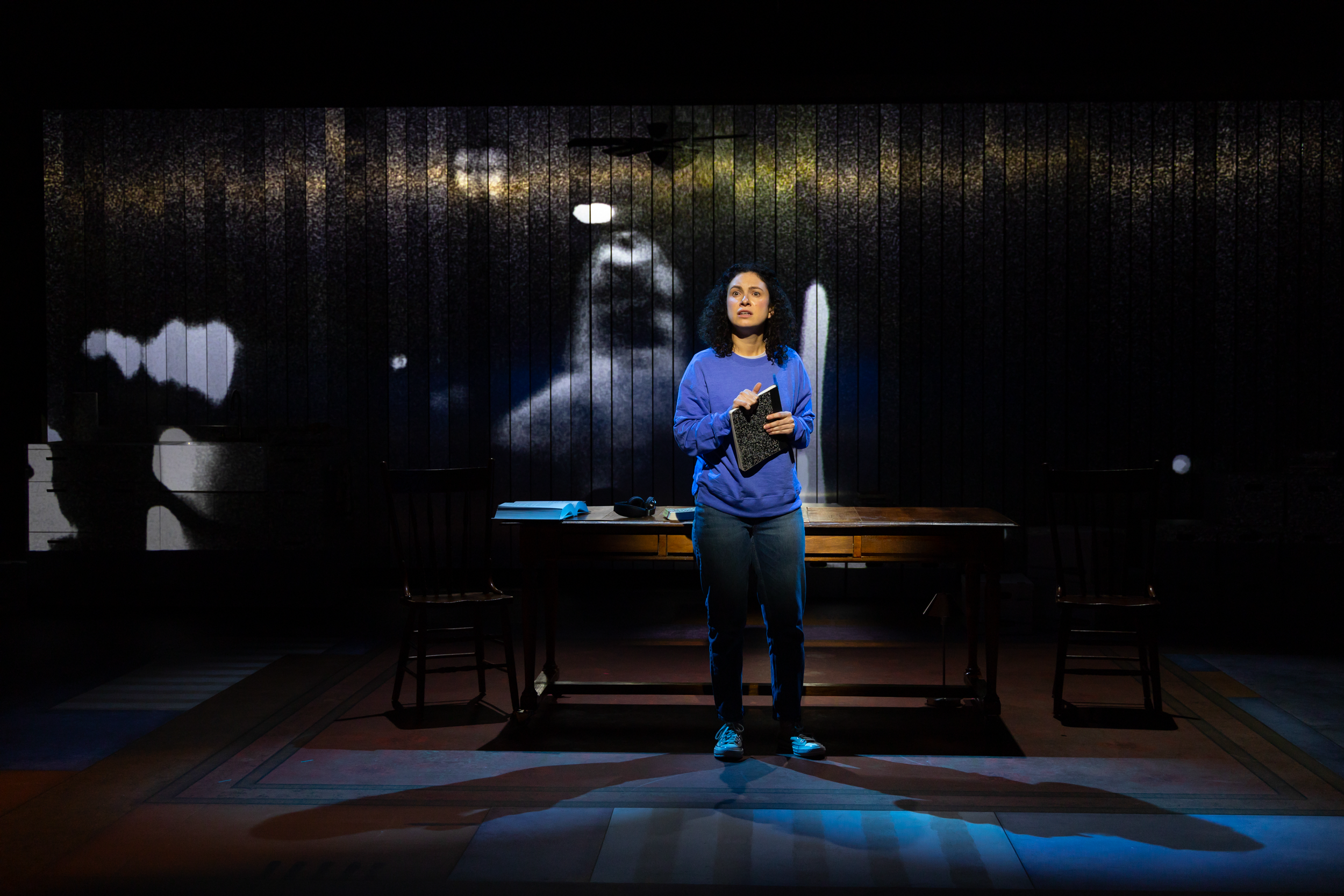Review of All My Sons, Hartford Stage
“Patriotism,” Samuel Johnson once quipped, “is the last refuge of the scoundrel.” Thinking of Arthur Miller’s second play All My Sons, now in a powerful revival at Hartford Stage, directed by Melia Bensussen and starring Marsha Mason and Michael Gaston, we may wish to alter the adage, replacing “patriotism” with “family.”
Joe Keller (Michael Gaston), Kate Keller (Marsha Mason) in Arthur Miller’s All My Sons at Hartford Stage (photo by T. Charles Erickson)
Meet the Kellers: Joe (Michael Gaston) is a friendly, neighborhood patriarch relaxing in his backyard; he welcomes the neighborhood doctor, Jim Bayliss (Godfrey L. Simmons, Jr.), sharing his pipe tobacco; he entertains a local boy, Bert (Malachy Glanovsky), with plots to police the neighborhood and slap any malefactors, who might, for instance, say a dirty word, into the jail he claims to harbor in his basement. And Joe has a son, Chris (Ben Katz), who has served responsibly in the recent war (the setting is 1946 Ohio), and seems a chip off the old block. While we’ve no grounds to think we may be trespassing into O’Neill territory, we might reasonably suspect that the trouble in this affable collective will have something to do with Mom—Kate Keller (Marsha Mason).
Even before we meet her, we hear Joe worrying over how she will respond to the loss of a tree that split and fell over during the previous night’s storm. The tree was planted in honor of Larry, the younger son who went to war and has been MIA for over three years. Kate believes he will still turn up.
Kate Keller (Marsha Mason), Ann Deever (Fiona Robberson) in Arthur Miller’s All My Sons at Hartford Stage (photo by T. Charles Erickson)
Marsha Mason’s Kate Keller is the worried heart of this play, a woman who, it seems, has endless faith, and who navigates through the affronts the family has suffered with her dignity intact. A major factor is how she stood by Joe when he went to prison briefly. As a military supplier, Joe’s company sent substandard parts to the U.S. Airforce during the war. Twenty-one U.S. planes and pilots were lost as a result. Joe was cleared; Steve Deever, his partner, is still serving time. But if we think Kate is the staunch supportive type, watch how rigid she becomes when she realizes Chris wants to marry Ann Deever (Fiona Robberson), the gal Larry left behind and Steve’s daughter. Later revelations will expose Kate as not only deluded in her hopes but also complicit in the shirking of responsibility that marks the elder generation in this play. It’s a complex role that has been played by Joan Plowright, Dianne Wiest, Sally Fields, Annette Bening, and others. Mason, a four-time Oscar nominee for Best Actress, has down the matronly tone that makes Kate seems a hostess to the world, but also the tough streak that makes us think no one could ever put one over on her. Her ultimate vulnerability comes with her own realization of how firmly she believed one lie so as to not have to face a harsher truth. It’s a riveting dramatic moment.
Kate Keller (Marsha Mason) in Arthur Miller’s All My Sons at Hartford Stage (photo by T. Charles Erickson)
Melia Besnussen’s firm hand on Miller’s play lets the script yield up its plot points with a steady pace, so that we get to take the measure of each character as, first, at their best and most outgoing and then, gradually, as the deniers and shirkers who have been covering up their guilty knowledge. The key exception is Ann’s brother George (Reece Dos Santos) who visits in Act II straight from his father’s jail cell with an ax to grind. The Deever kids had abandoned their father, it seems, in his disgrace, but now George has a new take on things. He comes on as the one who will finally make Joe confess he played Steve false, and, like Kate, he feels that a marriage between Ann and Chris would be a further outrage.
George Deever (Reece Dos Santos), Ann Deever (Fiona Robberson) in Arthur Miller’s All My Sons at Hartford Stage (photo by T. Charles Erickson)
But watch how easily Kate is able to smooth over George’s ire, getting him to suddenly admit that he’s only really felt at home at the Kellers’. It’s a telling moment because the course of the play will turn on a dime and go the other way—into all the reasons we can’t trust our fondness for the Kellers. And once the full weight of the past asserts itself, we may find ourselves questioning the fantasy of home and of belonging that the play wants us to get beyond. For Miller’s play has its eye on war profiteers and all those who use “serving their country” as an excuse for all kinds of malfeasance. But the play also candidly confronts the comfortable lies that people use to defend themselves against inconvenient or even catastrophic truths. Joe’s excuse for his behavior comes down to the sorts of things we’ve heard from serial killers like Tony Soprano or from wheeling-and-dealing vipers like Logan Roy: I did it for my kids, I did it for my family. How can we deny the strength of the plea?
Joe Keller (Michael Gaston), Ann Deever (Fiona Robberson) in Arthur Miller’s All My Sons at Hartford Stage (photo by T. Charles Erickson)
Wartime demands that one stick it to one’s enemies in the name of survival and victory, but when one is sticking it to one’s partners and to one’s customers and, mortally, to one’s own country can one still tout survival above all? Any such victory feels horribly hollow. And that’s where Miller’s play takes us, as any sense of just deserts is apt to make us wonder what really could be fair or just for the people in this play.
There is much to note here that is first rate. Riw Rakkulchon’s set is a stunning use of the space, with clearly delineated segments while also fully naturalistic, as a comfortable yard behind a house that can be entered (some interesting effects are achieved by letting us see actors inside the house), with a wide expanse of water fading into sky behind. In addition to the house, actors can enter or leave the scene in three directions, making for very lively coming and going as neighbors drop in or depart, or when tensions provoke a character to storm off. Mary Louise Geiger’s lighting gives both the broad strokes of time of day and also the more subtle lightings that enhance particular scenes, and the lighting within the house has the feel of coziness that seems just right. An-lin Dauber’s costumes are period without seeming unduly dated, and have an earnest Sears & Roebuck style, but for dressier moments—as when Kate gets set for a night out.
Dr. Jim Bayliss (Godfrey L. Simmons, Jr.), Kate Keller (Marsha Mason) in Arthur Miller’s All My Sons at Hartford Stage (photo by T. Charles Erickson)
As the other star of the show, Michael Gaston’s Joe is impeccably presented, his gruff bonhomie quite likeable, his efforts to defend himself from any soul-searching full of a maudlin conviction that sentiment should be on his side. His final realization of the effects of his duplicity make for a staggering tearful moment. In the film made of the play, Edward G. Robinson, as Joe, can’t help but seem sinister and the soundtrack adds to the effect. Gaston’s Joe is much more credible as a living instance, perhaps, of Hannah Arendt’s notion of “the banality of evil.”
Chris Keller (Ben Katz), Joe Keller (Michael Gaston) in Arthur Miller’s All My Sons at Hartford Stage (photo by T. Charles Erickson)
More than able support comes from Ben Katz as Chris, whose outburst at his father is an emotional highpoint, full of rage, frustration and the kind of hurt love that hopes a failure can be made better; Fiona Robberson is quite memorable as Ann; though her role is often subdued, the times when she seems ready to fly off the handle have great snap and drive. As George Deever, Reece Dos Santos gets to sway our sympathies toward the Deevers while also letting us feel George’s ambivalence, now that he finds himself welcomed in the place he left behind. Godfrey L. Simmons, Jr., is also notable as Dr. Jim Bayliss, who gives us the tone Miller likes to sound, of a depressed Chorus whose sense of how dark fate will ultimately will out fills out the play. And Malachy Glanovsky hits perfectly the childish enthusiasm of Bert, giving us, early on, a reason to like Joe Keller.
Bert (Malachy Glanovsky), Joe Keller (Michael Gaston) in Arthur Miller’s All My Sons at Hartford Stage (photo by T. Charles Erickson)
Vibrant, gripping, relevant to the anxieties that should make any community or family question its unexamined truths, All My Sons is for everyone.
All My Sons
By Arthur Miller
Directed by Melia Bensussen
Scenic Design: Riw Rakkulchon; Costume Design: An-lin Dauber; Lighting Design: Mary Louise Geiger; Original Music & Sound Design: Lucas Clopton; Wig, Hair, & Makeup Design: J. Jared Jonas; Fight Director: Ted Hewlett; Voice & Dialect Coach: Julie Foh; Casting: Alaine Alldaffer; Youth Coordinator: Shelby Demke; Production Stage Manager: Nicole Wiegert; Assistant Sage Manager: Theresa Stark; Associate Artistic Director: Zoë Golub-Sass; Director of Production: Bryan T. Holcombe; General Manager: Emily Van Scoy
Cast: Marsha Mason, Michael Gaston, Yadira Correa, Reece Dos Santos, Ben Katz, Fiona Robberson, Godfrey L. Simmons, Jr., Dan Whelton, Caitlin Zoz, Malachy Glanovsky
Hartford Stage
April 11-May 5, 2024






